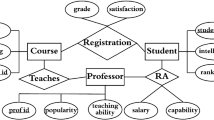Abstract
Traditional machine learning systems learn from non-relational data but in fact most of the real world data is relational. Normally the learning task is done using a single flat file, which prevents the discovery of effective relations among records. Inductive logic programming and statistical relational learning partially solve this problem. In this work, we resource to another method to overcome this problem and propose the T-SPPA: Trended Statistical PreProcessing Algorithm, a preprocessing method that translates related records to one single record before learning. Using different kinds of data, we compare our results when learning with the transformed data with results produced when learning from the original data to demonstrate the efficacy of our method.
Access this chapter
Tax calculation will be finalised at checkout
Purchases are for personal use only
Preview
Unable to display preview. Download preview PDF.
Similar content being viewed by others
References
Berthold, M.R., Cebron, N., Dill, F., Gabriel, T.R., Kötter, T., Meinl, T., Ohl, P., Sieb, C., Thiel, K., Wiswedel, B.: KNIME: The Konstanz Information Miner. In: Studies in Classification, Data Analysis, and Knowledge Organization (GfKL 2007), Springer, Heidelberg (2007)
Helge Toutenberg, C., Rao, R.: Linear Models - Least Squares and Alternatives, 2nd edn. Springer, Heidelberg (1999)
Debnath, G., Shusterman, A., Hansch, C., Debnath, A.K, Lopez de Compadre, R.L.: Structure-activity relationship of mutagenic aromatic and heteroaromatic nitro compounds. correlation with molecular orbital energies and hydrophobicity. Journal of medicinal chemistry 34(2), 786–797 (1991)
Getoor, L., Taskar, B.: Introduction to Statistical Relational Learning. MIT Press, Cambridge (2007)
Hall, M., Frank, E., Holmes, G., Pfahringer, B., Reutemann, P., Witten, I.H.: The weka data mining software: an update. SIGKDD Explor. Newsl. 11 (November 2009)
Knobbe, A.J., de Haas, M., Siebes, A.: Propositionalisation and aggregates. In: De Raedt, L., Siebes, A. (eds.) PKDD 2001. LNCS (LNAI), vol. 2168, pp. 277–288. Springer, Heidelberg (2001)
Lavrac, N., Dzeroski, S.: Inductive Logic Programming: Techniques and Applications. chapter 11, Ellis Horwood, New York (1994)
Hunter, E.J., Ramig, L.O., Little, M.A., McSharry, P.: Suitability of dysphonia measurements for telemonitoring of parkinson’s disease. IEEE Transactions on Biomedical Engineering (2008)
Mierswa, I., Wurst, M., Klinkenberg, R., Scholz, M., Euler, T.: Yale: Rapid prototyping for complex data mining tasks. In: Ungar, L., Craven, M., Gunopulos, D., Eliassi-Rad, T. (eds.) KDD 2006: Proceedings of the 12th ACM SIGKDD international conference on Knowledge discovery and data mining, pp. 935–940. ACM, New York (2006)
Theja, P.V.V.K., Vanajakshi, L.: Short term prediction of traffic parameters using support vector machines technique. In: 3rd International Conference on Emerging Trends in Engineering and Technology (ICETET) 2010, pp. 70–75 (2010)
Pintelas, P., Kotsiantis, S., Kanellopoulos, D.: Data preprocessing for supervised leaning. International Journal of Computer Science 1(2), 111–117 (2006)
Srinivasan, A.: The Aleph Manual (2001)
Witten, I.H., Frank, E.: Data Mining: Practical machine learning tools and techniques, 2nd edn. Morgan Kaufmann, San Francisco (2005)
Author information
Authors and Affiliations
Editor information
Editors and Affiliations
Rights and permissions
Copyright information
© 2011 Springer-Verlag Berlin Heidelberg
About this paper
Cite this paper
Silva, T., Dutra, I. (2011). T-SPPA: Trended Statistical PreProcessing Algorithm. In: Snasel, V., Platos, J., El-Qawasmeh, E. (eds) Digital Information Processing and Communications. ICDIPC 2011. Communications in Computer and Information Science, vol 188. Springer, Berlin, Heidelberg. https://doi.org/10.1007/978-3-642-22389-1_11
Download citation
DOI: https://doi.org/10.1007/978-3-642-22389-1_11
Publisher Name: Springer, Berlin, Heidelberg
Print ISBN: 978-3-642-22388-4
Online ISBN: 978-3-642-22389-1
eBook Packages: Computer ScienceComputer Science (R0)





